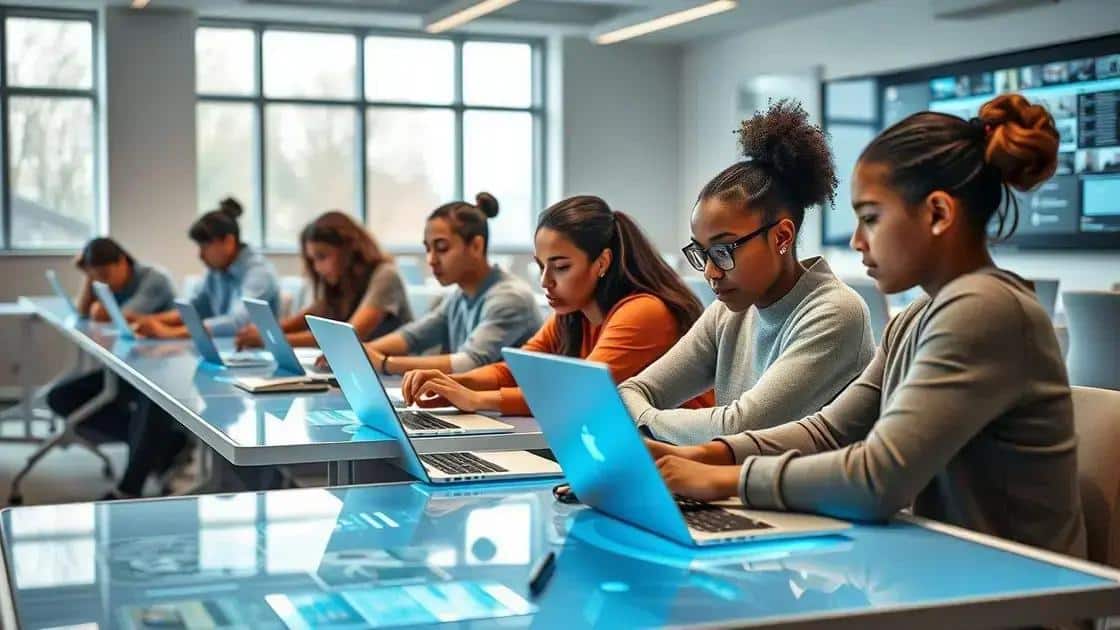Access to higher education: your path to success

Access to higher education is essential for personal and societal growth, as it provides opportunities through financial support, technology-enabled learning, and community engagement, helping individuals overcome barriers and succeed academically.
Access to higher education opens doors to countless opportunities for personal and professional growth. Have you ever considered how it could transform your future? Let’s dive into this crucial topic.
Understanding the importance of higher education
Understanding the importance of higher education is crucial for anyone seeking to improve their life and career prospects. Education can provide you with the skills and knowledge necessary to excel in various fields, opening many doors that may otherwise remain closed.
Benefits of Higher Education
Higher education not only boosts your resume but also cultivates critical thinking skills. Graduates tend to earn more over their lifetimes compared to those without a degree. It also enhances your career opportunities, empowering you to pursue your passion effectively.
- Higher earning potential
- Improved job prospects
- Personal growth and development
- Networking opportunities
Moreover, engaging with classmates and professors adds to your learning experience. You will be part of a community that values knowledge, pushing you to achieve your goals. Participating in discussions and group projects helps hone your teamwork and communication skills, which are essential in the workplace.
Societal Impact
The impact of higher education extends beyond individual benefits. An educated workforce contributes positively to society. It fosters innovation and drives economic growth. Communities with higher education levels often experience improved public health and lower crime rates, creating safer environments for everyone.
Accessibility to higher education is vital as it fuels progress and equality. Many programs aim to reduce barriers, making education more attainable for diverse populations. Scholarships and online courses are prime examples of how institutions are working to include everyone.
It’s clear that understanding the importance of higher education can make a significant difference in your life and the surrounding community. By pursuing your education, not only do you invest in your future, but you also contribute to a better society.
Barriers to accessing higher education

Barriers to accessing higher education exist in various forms, affecting many potential students. Understanding these obstacles is key to addressing them effectively. Financial constraints, lack of information, and societal influences play significant roles in determining who can pursue education after high school.
Common Financial Barriers
Tuition costs can be overwhelming. Many students face insurmountable debt, which deters them from enrolling in college. Additionally, the costs of books, supplies, and housing can add up quickly, making education feel unattainable. Scholarships and financial aid are available, but they require navigation through complex systems.
- High tuition fees
- Limited access to scholarships
- Cost of living expenses
- Insufficient financial literacy
Besides financial issues, many students do not receive adequate information on how to apply for higher education. Schools may lack the resources to guide students in this process. As a result, numerous opportunities remain hidden, leaving students unaware of their options. The digital divide also affects access to online resources, critically impacting those from lower-income families.
Societal and Cultural Influences
Societal expectations and cultural barriers can discourage many individuals from pursuing higher education. Stereotypes and discrimination play a role in hindering access for marginalized groups. Family responsibilities, particularly for women, can also limit educational pursuits, forcing them to prioritize work or family over education.
Moreover, the stigma surrounding certain fields of study can impact students’ choices. For example, those interested in non-traditional roles may face pressure to conform to societal norms. These influences highlight the need for more supportive environments that encourage exploration and growth within diverse communities.
Ultimately, recognizing and addressing these barriers can pave the way for greater access to higher education. By understanding these challenges, we can help create solutions that ensure all students have the opportunities they deserve.
Strategies to enhance access
Implementing effective strategies to enhance access to higher education is vital for empowering individuals and fostering equality. Many efforts are underway to ensure that everyone can pursue their educational dreams.
Financial Support Initiatives
One major strategy involves increasing financial support for students. Scholarships, grants, and work-study programs can significantly alleviate the burden of tuition. By providing financial education and resources, institutions can guide students on how to access these funds. This approach can help make education much more attainable for those who may otherwise struggle to afford it.
- Creating more scholarships specifically for underrepresented groups
- Enhancing transparency about financial aid options
- Encouraging community fundraising efforts
- Implementing tuition-free programs at community colleges
Alongside financial support, improving access to information is essential. Many potential students lack critical knowledge about the application process or available resources. Schools should offer robust counseling services to guide students through educational pathways. Workshops or seminars can be beneficial in explaining the steps needed to apply for colleges and scholarships.
Leveraging Technology for Access
Technology is another pathway for enhancing access to higher education. Online courses and remote learning options have revolutionized education. This flexibility allows students to balance their studies with work or family commitments. Institutions can create more online resources and virtual campuses to cater to diverse learning needs, making education more accessible for everyone.
Moreover, using social media platforms to share success stories and opportunities can attract and motivate students. Highlighting diverse role models can inspire potential students to pursue their goals despite obstacles. Community engagement and outreach programs can also raise awareness about the importance of education, creating a supportive environment for learning.
By adopting these strategies, we can foster a more inclusive educational landscape that promotes equitable access to higher education. The combined efforts of schools, communities, and individuals can pave the way for future generations to succeed.
The role of technology in education access

The role of technology in enhancing access to higher education is increasingly significant. It has transformed the way students learn and connect with educational resources. Leveraging technology helps break down barriers that previously limited access to education.
Online Learning Platforms
Online learning platforms have revolutionized education by providing flexibility and accessibility. Students can attend classes from anywhere in the world, making it easier to balance work and family commitments alongside their studies. These platforms offer a wide range of courses, allowing students to choose paths that suit their interests and career goals.
- Access to courses from renowned universities
- Self-paced learning options
- Interactive resources and virtual classrooms
- Availability of recorded lectures for review
Moreover, technology facilitates communication between students and educators. Students can ask questions, participate in discussions, and receive feedback in real-time. This interaction helps create a more engaging learning environment, fostering a sense of community among remote learners.
Enhancing Educational Resources
Technology also enhances educational resources by providing easy access to libraries, research materials, and tools that support learning. Students can explore vast online databases, digital books, and multimedia resources that enrich their understanding of subjects. This access promotes independent research and critical thinking.
Additionally, assistive technologies play a crucial role in making education more inclusive. Tools such as screen readers, language translation apps, and adaptive software ensure that students with varying needs can participate in learning activities. This inclusivity helps empower all learners to pursue higher education.
As we continue to embrace advancements in technology, understanding its role in education access is essential. Technology creates opportunities for those who may have been previously underserved, paving the way for a brighter future for all.
FAQ – Questions About Access to Higher Education
What are the main barriers to accessing higher education?
Common barriers include financial constraints, lack of information, and societal influences that discourage some individuals from pursuing education.
How can technology help in accessing higher education?
Technology facilitates online learning, provides access to resources, and improves communication between students and educators, making education more accessible.
What role do scholarships play in education access?
Scholarships are crucial as they alleviate financial burdens, enabling students from low-income backgrounds to pursue their academic goals.
How can communities support education access?
Communities can promote educational initiatives, provide resources, and create awareness about available opportunities to enhance access to higher education.






